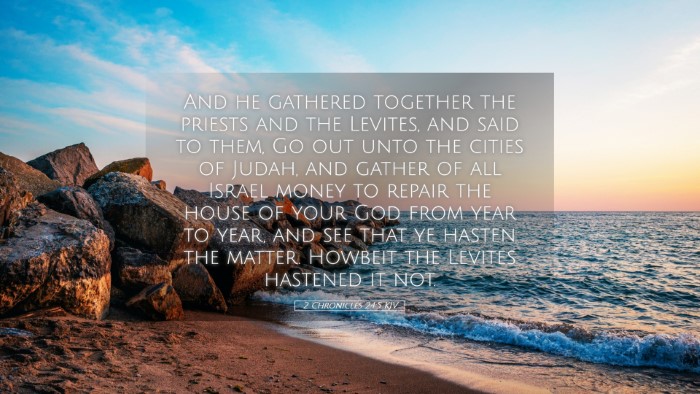Commentary on 2 Chronicles 24:5
Verse Context: 2 Chronicles 24:5 states: “And he gathered together the priests and the Levites, and said to them, Go out unto the cities of Judah, and gather of all Israel money to repair the house of your God from year to year, and see that ye hasten the matter.” This verse captures an essential moment in the reign of King Joash of Judah, reflecting both his religious commitment and a significant revival of temple worship.
Overview of the Verse
This verse sets the stage for a revival of worship in Judah as King Joash initiates a plan to restore the temple. His action not only demonstrates his leadership but also illustrates the importance of communal worship and the maintenance of sacred spaces. The emphasis on gathering funds for repairs indicates a proactive approach to faith and the significance of dedicating resources towards worship.
Theological Insights
Importance of the Temple: The temple in Jerusalem was not merely a physical structure but represented the dwelling place of God among His people. The repair of the temple signifies returning to a right relationship with God and renewing a covenant commitment. Matthew Henry emphasizes that “the house of God is a house of prayer, and it must be kept in good repair.” This statement affirms that the condition of the temple can reflect the spiritual state of the nation.
Role of Leadership: Joash’s call to the priests and Levites indicates the crucial role of spiritual leadership in promoting collective worship and maintaining sacred practices. Albert Barnes notes that leaders should take initiative in spiritual matters, urging congregations to participate in the work of God. Joash sets a template for leaders today by prioritizing the spiritual needs of his people.
Historical Context
At this time, Judah had experienced periods of both faithfulness and rebellion against God. The temple had fallen into disrepair, reflecting the spiritual decline among the people. Adam Clarke points out that Joash's reforms come after a significant period of idolatry and neglect. His actions signify a return to faithfulness and an attempt to restore the worship practices ordained by God in the past.
Exegesis
- Gathering the Priests and Levites: Joash’s directive to gather the priests and Levites highlights the importance of collaboration in ministry. The task of rebuilding and restoring worship is not a solo effort; it requires the collective participation of spiritual leaders.
- Call for Action: The phrase “Go out unto the cities of Judah” conveys urgency. This directive encourages widespread engagement from the community in raising funds for the temple. The people’s participation is a crucial element of revival.
- Financial Stewardship: The mention of gathering money to repair the temple emphasizes the need for stewardship. Churches and communities must recognize the importance of allocating financial resources for spiritual endeavors.
Practical Applications
This verse offers several practical insights for contemporary ministry:
- Revival Initiatives: Like Joash, church leaders today are called to foster true worship and revival by prioritizing sacred spaces and practices within the community.
- Community Engagement: Effective ministry requires a call to action that mobilizes the congregation. Just as Joash rallied support, leaders must foster a sense of ownership among church members.
- Financial Responsibility: Churches should teach the value of giving, not only for operational needs but also for the physical maintenance of worship spaces, ensuring that they remain conducive for encountering God.
Conclusion
2 Chronicles 24:5 encapsulates the essence of spiritual leadership, community engagement, and the collective responsibility of worship. By focusing on the restoration of the temple, Joash not only seeks to restore a physical structure but to revitalize the people's relationship with God. This verse serves as a challenge for modern readers and leaders to consider how they can contribute towards the sacred practices of their communities and ensure that their worship is both meaningful and well-maintained.


